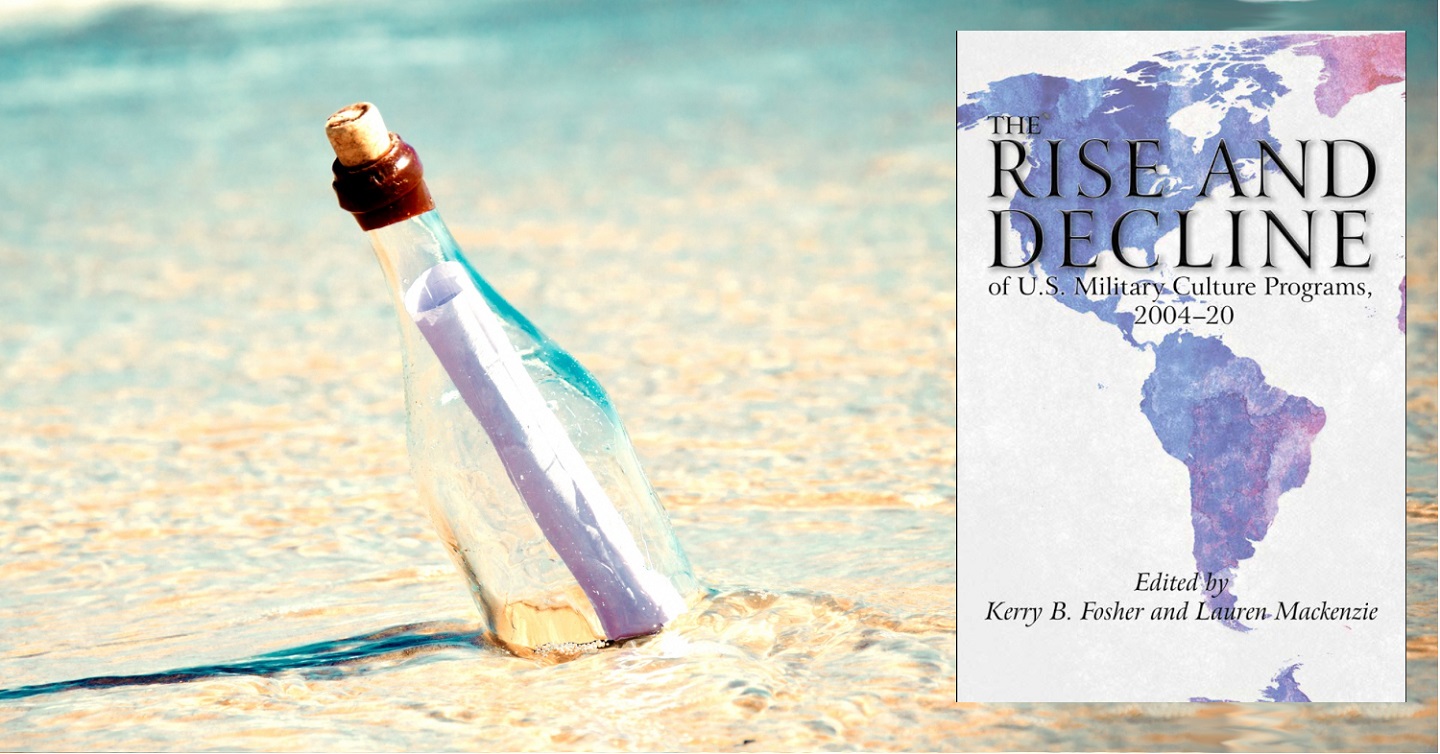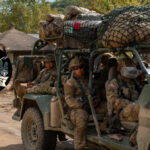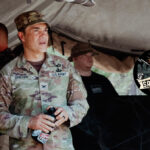
Anyone paying attention to the last two decades of conflict has to acknowledge that understanding culture is important. Even if you think that culture is just that “squishy sh*t”, you’ve got to be honest that it’s difficult to understand enemy intent, analyze how best to train an allied force or comprehend the will of the people if can’t even grasp the basics of the cultural foundations of those populations. And yet the DoD and the individual service components have a strange on-again, off-again relationship with the understanding and instruction of culture. A BETTER PEACE welcomes Kerry Fosher, Lauren Mackenzie and Allison Abbe to the virtual studio to discuss the role of cultural programs in military training and their new book The Rise and Decline Of U.S. Military Culture Programs 2004 To 2020. The three join podcast editor Ron Granieri to look at how the services have created and re-created cultural training programs over and over again seemingly forgetting lessons learned time and again.
…the capability gets shut down and then recreated every couple of decades. The consequences of that, and the lack of continuity that it brings are borne by junior military personnel and the people that they interact with.
Podcast: Download

Kerry Fosher is a cultural anthropologist and Director of Research at Marine Corps University. She worked on military and intelligence community culture programs from 2006 through 2020, including 10 years as the director of research for the Marine Corps’ service-wide program that provided cultural, regional, and language training and education.
Lauren Mackenzie is Marine Corps University’s Professor of Military Cross-Cultural Competence. Her research interests revolve around the impact of cultural differences on difficult conversations, to include: end-of-life communication, relationship repair strategies, and, most recently, the role of failure in teaching and learning.
Allison Abbe is professor of organizational studies at the U.S. Army War College. She led a program of research at the Army Research Institute from 2006 to 2011 on assessing and developing cultural skills in military personnel. She holds a PhD in social and personality psychology and currently teaches strategic leadership, defense management, and inclusive leadership.
Ron Granieri is an Associate Professor of History at the U.S. Army War College and the Editor of A BETTER PEACE.
The views expressed in this presentation are those of the speakers and do not necessarily reflect those of the U.S. Army War College, U.S. Army, or Department of Defense.
Photo Credit: Water photo created by photoangel – www.freepik.com





Much of the context — within which the matters being discussed here occurred — this was, generally speaking, within the context of:
a. The Old Cold War of yesterday (from 1945 to 1990; wherein, the Soviets/the communists are in “revolutionary”/”expansionist” mode and the U.S./the West is in “containment” and/or “roll back mode) and
b. The New/Reverse Cold War of today (from 1991 to present; wherein, the U.S./the West is in “revolutionary”/”expansionist” mode and such nations as Russia and China are in “containment” and/or “roll back” mode).
Thus, only the four year period of World War II is not addressed by my such “context” suggestion above; which leaves us to (more properly?) consider:
a. The perennial building and decline of cultural capabilities
b. More from the almost 80 year perspective of these “cold wars” and, thus more specifically,
c. More from their “revolutionary” and “expansionist” versus “containment” and “roll back” nature and character.
Bottom Line Thought — Based on the Above:
Once we establish this “cold war” framework for our analysis and discussion, then it becomes easy to see that the less-modern/non-modern cultures (that is, cultures which are not capitalist or communist); how these such more-traditional cultures can easily become:
a. The “natural allies” of the countries engaged in “containment” and/or “roll back” activities. And:
b. The “natural enemies” of the countries engaged in “revolutionary” and “expansionist” activities (or, if you prefer, engaged in one version or another of “modernization” activities).
Is this helpful?
If the essence of the Old Cold War of yesterday (a period of great power competition) was world revolution (as advocated by the Soviets/the communists back then) — and world resistance to same (as led by the U.S./the West during that timeframe) — and:
If the essence of the New/Reverse Cold War of today (also a period of great power competition) is also world revolution (in this case, as advocated by the U.S./the West) — and world resistance to same (as led, in this case, by such nations as Russia and China) — then how in either of these such cases can anyone expect a soldier or statesperson (on whatever “side”) to do his job; this, without a clear understanding of the cultures within which these such conflicts will take place.
Here, for example from the Old Cold War, is an example of the Soviets/the communists not having such a clear understanding of the culture, in this case, of the Nicaraguans whom they sought to “transform” (A short-coming that the U.S./the West — in “resistance” mode back then — would capitalize on?):
” ‘Blood of Brothers’ is a graphic account of a country torn in half over the Sandinistas’ efforts to build a new political and economic order. Early on, Mr. Kinzer saw that Sandinista policies were alienating ordinary Nicaraguans. In 1983 most Nicaraguans had still not fallen to the depths of deprivation and despair which they would reach in later years, but many were already unhappy and restive. . . . When the Sandinistas decreed that foreign trade was to be a state monopoly, they effectively declared war on these small-scale entrepreneurs. . . . [ And ] by trying to transform [ the existing system of food production ] so completely and so suddenly, they were underestimating the deeply ingrained conservatism of Nicaraguan peasants.”
(See the April 7, 1991 New York Times article “The Sandinista Decade,” by Linda Robinson.)
Bottom Line Thought — Based on the Above:
In the current “turnabout is fair play” moment of the New/Reverse Cold War of today, opponents like Russia — indeed basing their “containment” strategy on an understanding of culture (in this case, the “deeply ingrained conservatism of the American peasants?”) — now prey on the U.S./the West in this exact same way:
“Compounding it all, Russia’s dictator has achieved all of this while creating sympathy in elements of the Right that mirrors the sympathy the Soviet Union achieved in elements of the Left. In other words, Putin is expanding Russian power and influence while mounting a cultural critique that resonates with some American audiences, casting himself as a defender of Christian civilization against Islam and the godless, decadent West.”
(See the “National Review” item entitled: “How Russia Wins” by David French.)
This item, also, seems to show the importance of understanding both one’s own and other societies’ cultures; this, as a principal and primary requirement for soldiers and statespersons working with and in the New-Reverse Cold War/the great power competition of today:
“In his annual appeal to the Federal Assembly in December 2013, Putin formulated this ‘independent path’ ideology by contrasting Russia’s ‘traditional values’ with the liberal values of the West. He said: ‘We know that there are more and more people in the world who support our position on defending traditional values that have made up the spiritual and moral foundation of civilization in every nation for thousands of years: the values of traditional families, real human life, including religious life, not just material existence but also spirituality, the values of humanism and global diversity.’ He proclaimed that Russia would defend and advance these traditional values in order to ‘prevent movement backward and downward, into chaotic darkness and a return to a primitive state.’
In Putin’s view, the fight over values is not far removed from geopolitical competition. ‘[Liberals] cannot simply dictate anything to anyone just like they have been attempting to do over the recent decades,’ he said in an interview with the Financial Times in 2019. ‘There is also the so-called liberal idea, which has outlived its purpose. Our Western partners have admitted that some elements of the liberal idea, such as multiculturalism, are no longer tenable,’ he added. …
As Putin passes his 20th year as Russia’s president, his domestic and foreign policy appears intended to contrast his country’s ‘independent path’ with the liberal and decadent regimes in the West. The invented battle of Western values versus Russia’s ‘traditional values’ is part of a Kremlin effort to justify its broader actions in the eyes of Russian citizens, placing them in the context of a global struggle in which Russia is the target of aggression. Ignoring and violating the provisions of international organizations to which it is a party thus becomes a demonstration of defending its conservative values from European liberalism. … ”
(See the “Open Democracy” article “Inside the Fight Over Russia’s Domestic Violence Law,” by Alexey Yurtaev, dated 17 February 2020)
Want another Old Cold War example also — showing the importance of understanding culture; this, as relates to great power competition? Possibly the following will do:
“The overt attack on Afghan social values was presented, by the resistance forces, as an attack on Islamic values. This was also seen as an attack on the honor of women. The initiatives introduced by PDPA (the communist Peoples Democratic Party of Afghanistan) — to impose literacy on women and girls — inevitably raised questions as to the potential role of women outside the home. This provoked defensive actions from men, concerned with protecting the honor of women with their families, and to also ensure that traditional roles of women within the domestic sphere continued to be performed. It also generated fears that the important roles of women, as the primary vehicles for passing traditional and Islamic values from one generation to another, would be undermined if they were exposed to external and, particularly, non-Islamic values. This enabled the exiled radical Islamic parties to claim leadership of the resistance and to also declare a jihad.” (Item in parenthesis above is mine.)
(See the book “Afghanistan” Aid, Armies and Empires,” by Peter Marsden; therein, see Page 58, in Chapter 4 entitled “The Soviet Military Intervention.”)
As we all know, the U.S./the West would use this “cultural clash,” to our advantage in the great power competition of the Old Cold War of yesterday.
(Now, countries like Russia seek return the favor — by using “cultural clashes” now against the U.S./the West — in the New-Reverse Cold War of today?)
This item, also, seems to show the importance of understanding both one’s own and other societies’ cultures; this, as a principal and primary requirement for soldiers and statespersons working with and in the New-Reverse Cold War/the great power competition of today:
“In his annual appeal to the Federal Assembly in December 2013, Putin formulated this ‘independent path’ ideology by contrasting Russia’s ‘traditional values’ with the liberal values of the West. He said: ‘We know that there are more and more people in the world who support our position on defending traditional values that have made up the spiritual and moral foundation of civilization in every nation for thousands of years: the values of traditional families, real human life, including religious life, not just material existence but also spirituality, the values of humanism and global diversity.’ He proclaimed that Russia would defend and advance these traditional values in order to ‘prevent movement backward and downward, into chaotic darkness and a return to a primitive state.’
In Putin’s view, the fight over values is not far removed from geopolitical competition. ‘[Liberals] cannot simply dictate anything to anyone just like they have been attempting to do over the recent decades,’ he said in an interview with the Financial Times in 2019. ‘There is also the so-called liberal idea, which has outlived its purpose. Our Western partners have admitted that some elements of the liberal idea, such as multiculturalism, are no longer tenable,’ he added. …
As Putin passes his 20th year as Russia’s president, his domestic and foreign policy appears intended to contrast his country’s ‘independent path’ with the liberal and decadent regimes in the West. The invented battle of Western values versus Russia’s ‘traditional values’ is part of a Kremlin effort to justify its broader actions in the eyes of Russian citizens, placing them in the context of a global struggle in which Russia is the target of aggression. Ignoring and violating the provisions of international organizations to which it is a party thus becomes a demonstration of defending its conservative values from European liberalism. … ”
(See the “Open Democracy” article “Inside the Fight Over Russia’s Domestic Violence Law,” by Alexey Yurtaev, dated 17 February 2020)
Want another Old Cold War example also — showing the importance of understanding culture; this, as relates to great power competition? Possibly the following will do:
“The overt attack on Afghan social values was presented, by the resistance forces, as an attack on Islamic values. This was also seen as an attack on the honor of women. The initiatives introduced by PDPA (the communist Peoples Democratic Party of Afghanistan) — to impose literacy on women and girls — inevitably raised questions as to the potential role of women outside the home. This provoked defensive actions from men, concerned with protecting the honor of women with their families, and to also ensure that traditional roles of women within the domestic sphere continued to be performed. It also generated fears that the important roles of women, as the primary vehicles for passing traditional and Islamic values from one generation to another, would be undermined if they were exposed to external and, particularly, non-Islamic values. This enabled the exiled radical Islamic parties to claim leadership of the resistance and to also declare a jihad.” (Item in parenthesis above is mine.)
(See the book “Afghanistan” Aid, Armies and Empires,” by Peter Marsden; therein, see Page 58, in Chapter 4 entitled “The Soviet Military Intervention.”)
As we all know, the U.S./the West would use this “cultural clash,” to our advantage in the great power competition of the Old Cold War of yesterday.
(Now, countries like Russia seek return the favor — by using “cultural clashes” now against the U.S./the West — in the New-Reverse Cold War of today?)
In great power competitions such as cold wars (one side seeking to gaining greater power, influence and control, this, by advancing, for example, political and economic communism [Old Cold War] — or market-democracy [New/Reverse Cold War] — more throughout the world; the other side seeking to prevent their opponent from gaining such greater power, influence and control, this, by employing “containment” and/or “roll back” strategies and related activities, against their opponent’s such “advancing” strategies and efforts) —
In great power competitions/cold wars such as these, “culture” — and specifically “conservative” and/or “traditional” culture — this is (a) often “weaponized” by the party doing “containment” and/or “roll back” and, indeed, (b) often becomes the primary weapon of choice, for these such “containment” and/or “roll back” folks. (Conservative and/or traditional culture, after all, being the “natural enemy” of ANYONE seeking to achieve significant political, economic, social and/or value “change” and, thus, being the “natural ally” of ANYONE seeking to prevent such change from taking place?)
Here — in the Wilson Center’s “Kennan Cable No. 53” and, therein, in the article “Russia’s Traditional Values and Domestic Violence,” by Olimpiada Usanova, dated 1 June 2020 — we find an example of Putin’s such large-scale/across-the board “weaponizing” of conservative/traditional culture:
“In his annual appeal to the Federal Assembly in December 2013, Putin formulated this “independent path” ideology by contrasting Russia’s “traditional values” with the liberal values of the West. He said: ‘We know that there are more and more people in the world who support our position on defending traditional values that have made up the spiritual and moral foundation of civilization in every nation for thousands of years: the values of traditional families, real human life, including religious life, not just material existence but also spirituality, the values of humanism and global diversity.’ He proclaimed that Russia would defend and advance these traditional values in order to ‘prevent movement backward and downward, into chaotic darkness and a return to a primitive state.’
In Putin’s view, the fight over values is not far removed from geopolitical competition. ‘[Liberals] cannot simply dictate anything to anyone just like they have been attempting to do over the recent decades,’ he said in an interview with the Financial Times in 2019. ‘There is also the so-called liberal idea, which has outlived its purpose. Our Western partners have admitted that some elements of the liberal idea, such as multiculturalism, are no longer tenable,’ he added.”
Bottom Line Thought — Based on the Above:
Given — as noted above — the exceptionally central roll that “culture” thus plays in “cold wars,” how is it that soldiers and/or statespersons can do their jobs — yesterday or today — this, without a significant understanding of same?
Taking the concept of “cold wars” off the table for a moment, we should realize that the natural , normal and perennial conflict between “market society” and “community” this, also, dictates that (a) soldiers and statespersons (b) with regard to their basic responsibilities (for example, to defend the constitution against all enemies — foreign and domestic) must be (c) not just casually — but indeed keenly — aware of “culture” (which, both here at home and there abroad, is forever and always under attack; this, by market requirements as outlined in my first quoted item below):
“Capitalism is the most successful wealth-creating economic system that the world has ever known; no other system, as the distinguished economist Joseph Schumpeter pointed out, has benefited ‘the common people’ as much. Capitalism, he observed, creates wealth through advancing continuously to every higher levels of productivity and technological sophistication; this process requires that the ‘old’ be destroyed before the ‘new’ can take over. … This process of ‘creative destruction,’ to use Schumpeter’s term, produces many winners but also many losers, at least in the short term, and poses a serious threat to traditional social values, beliefs, and institutions. … (These) threatened individuals, groups or nations (in turn) constitute an ever-present force that could overthrow or at least significantly disrupt the capitalist system.” (Items in parenthesis above are mine.)
(From the book “The Challenge of the Global Capitalism: The World Economy in the 21st Century,” by Robert Gilpin; therein, see the first page of the Introduction chapter.)
“In this new world disorder, the power of identity politics can no longer be denied. Western elites believed that in the twenty-first century, cosmopolitanism and globalism would triumph over atavism and tribal loyalties. They failed to understand the deep roots of identity politics in the human psyche and the necessity for those roots to find political expression in both foreign and domestic policy arenas. And they failed to understand that the very forces of economic and social development that cosmopolitanism and globalization fostered would generate turbulence and eventually resistance, as ‘Gemeinschaft’ (community) fought back against the onrushing ‘Gesellschaft’ (market society), in the classic terms sociologists favored a century ago.”
(See the Mar-Apr 2017 edition of “Foreign Affairs” and, therein, the article by Walter Russell Mead entitled “The Jacksonian Revolt: American Populism and the Liberal Order.”)
“All in all, the 1980s and 1990s were a Hayekian moment, when his once untimely liberalism came to be seen as timely. The intensification of market competition, internally and within each nation, created a more innovative and dynamic brand of capitalism. That in turn gave rise to a new chorus of laments that, as we have seen, have recurred since the eighteenth century: Community was breaking down; traditional ways of life were being destroyed; identities were thrown into question; solidarity was being undermined; egoism unleashed; wealth made conspicuous amid new inequality; philistinism was triumphant.”
(See the book “The Mind and the Market: Capitalism in Western Thought” by Jerry Z. Miller, in this case, from the section therein on Friedrich Hayek.)
Enjoyed the podcast and thought it could serve as an apt metaphor for the last 20 years of failed US military operations. Typical bass ackward DoD approach. We start wars in places where we don’t have the foggiest idea of how their cultures work, then late in the day, try to stand up classes to try and understand the culture. From what I can tell, the only ones who benefited from this exercise in futility were the well-paid experts and academics involved in this “noble” cultural enterprise. What a waste!